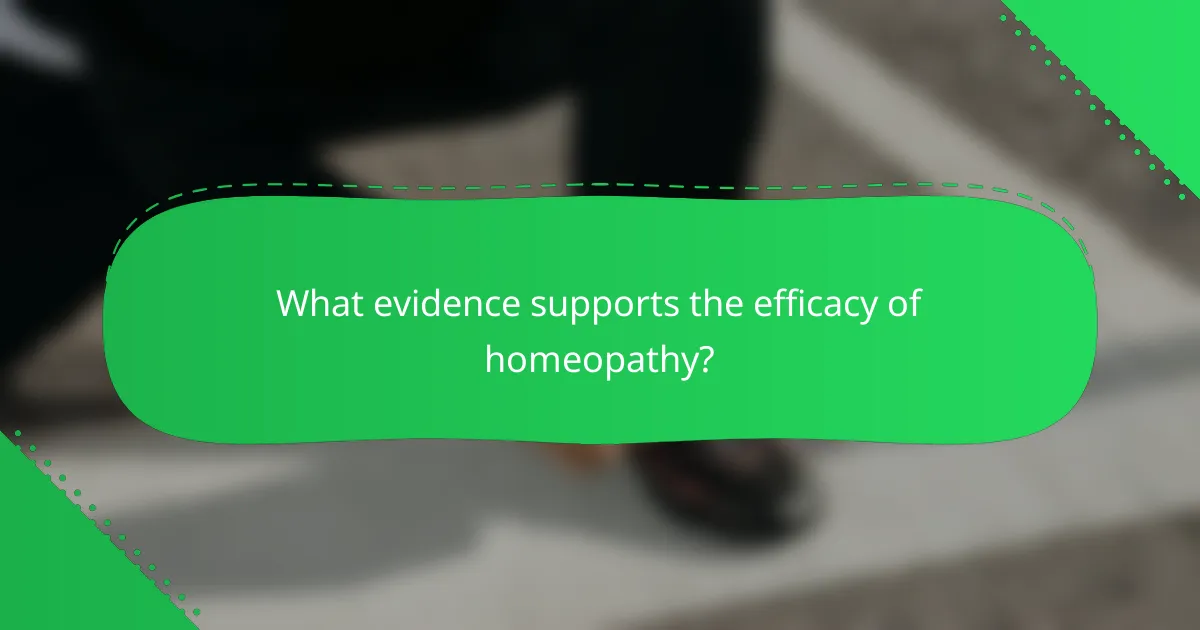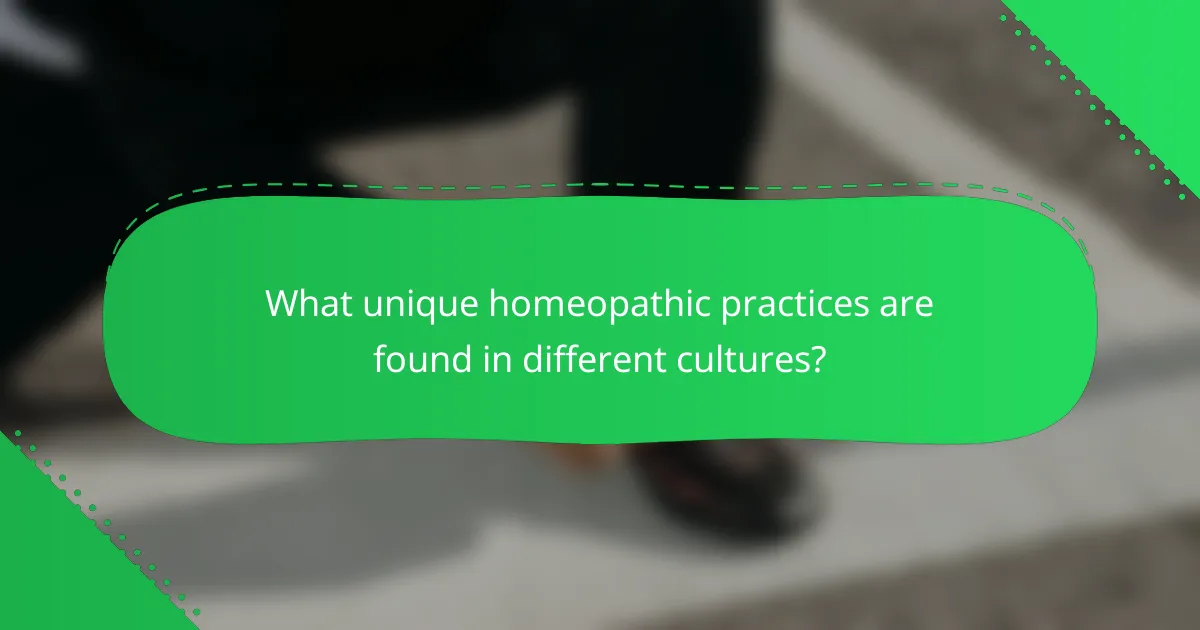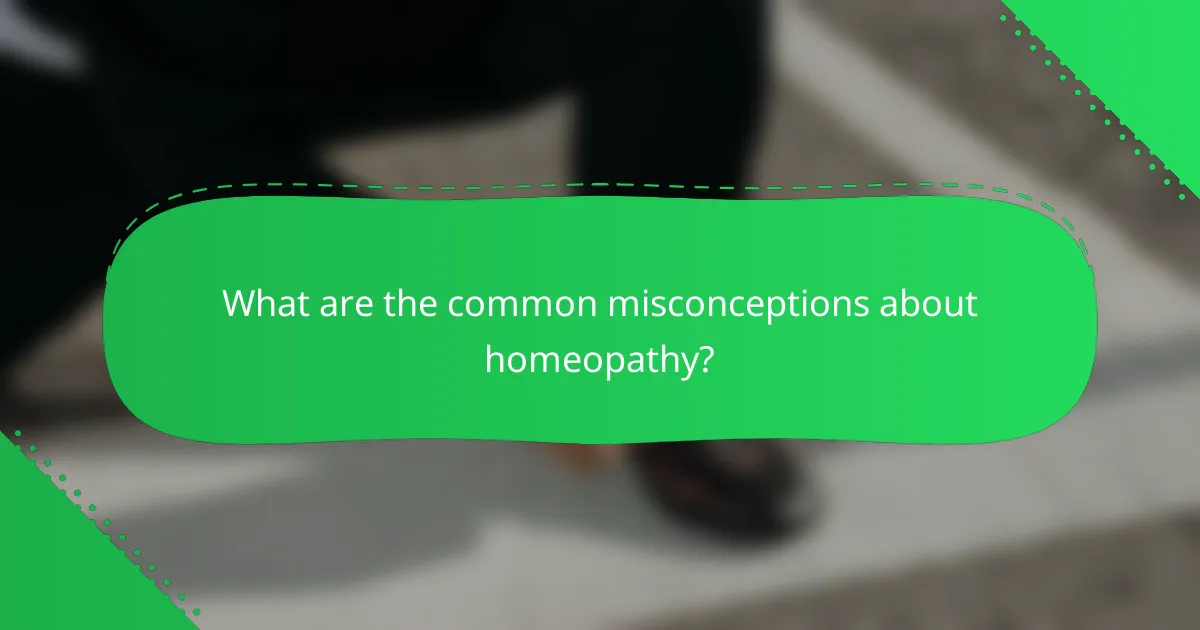Homeopathy offers a unique approach to health, emphasizing individualized treatment and holistic care. This article explores the fundamental principles of homeopathy, examines its efficacy through clinical evidence, and highlights diverse cultural perspectives on its practice worldwide. Understanding these aspects can enhance awareness and acceptance of homeopathy in various healthcare systems.

What are the fundamental principles of homeopathy?
Homeopathy is based on three fundamental principles: the law of similars, the law of infinitesimals, and the principle of single remedy. The law of similars posits that substances causing symptoms in healthy individuals can treat similar symptoms in the sick. The law of infinitesimals suggests that highly diluted substances retain therapeutic properties. The principle of single remedy emphasizes using one remedy at a time to address the patient’s condition. These principles guide practitioners in their approach to treatment and patient care.
How does the concept of ‘like cures like’ influence treatment?
The concept of ‘like cures like’ is fundamental in homeopathy, suggesting that substances causing symptoms in healthy individuals can treat similar symptoms in the sick. This principle influences treatment by guiding practitioners to select remedies based on symptom similarity rather than conventional methods. Homeopathy’s efficacy remains debated, but it is culturally embraced in various regions, highlighting its unique attribute of individualized treatment. As a result, patients often report positive outcomes, reinforcing the belief in homeopathy’s principles across different cultures.
What role does dilution play in homeopathic remedies?
Dilution plays a crucial role in homeopathic remedies by enhancing their potency while minimizing toxicity. Homeopathy relies on the principle of “like cures like,” where highly diluted substances are believed to stimulate the body’s healing processes. This unique attribute of extreme dilution, often beyond Avogadro’s number, differentiates homeopathy from conventional medicine. As a result, the efficacy of homeopathic remedies remains a subject of debate, with cultural perspectives influencing their acceptance worldwide.
How is the concept of vital force understood in homeopathy?
The concept of vital force in homeopathy refers to a dynamic energy that maintains health and balance within the body. Homeopathy posits that diseases arise from disturbances in this vital force, which can be restored through highly diluted remedies. This principle emphasizes individualization in treatment, as each person’s vital force responds uniquely to ailments. Cultural perspectives on vital force vary, influencing the acceptance and practice of homeopathy worldwide.

What evidence supports the efficacy of homeopathy?
Evidence supporting the efficacy of homeopathy includes various clinical trials and systematic reviews. Meta-analyses indicate that homeopathic treatments can be as effective as conventional medicine for certain conditions. For example, a systematic review published in the British Journal of Clinical Pharmacology found that homeopathy showed positive effects in treating conditions like allergies and respiratory issues. Additionally, the World Health Organization recognizes homeopathy’s role in primary healthcare in some cultures. However, the scientific community remains divided, with critics questioning the validity of these studies and citing the placebo effect. Overall, while some evidence exists, further research is necessary to establish definitive conclusions.
How do clinical trials evaluate homeopathic treatments?
Clinical trials evaluate homeopathic treatments through rigorous methodologies to determine their efficacy. These trials often involve randomization, control groups, and statistical analysis to assess outcomes. Researchers examine specific attributes such as symptom relief, duration of effects, and patient-reported outcomes. Unique challenges include the placebo effect, which can influence results, and the individualized nature of homeopathic prescriptions. Trials aim to provide evidence-based insights, yet results can vary, reflecting broader cultural perspectives on homeopathy’s role in healthcare.
What are the common criticisms regarding the effectiveness of homeopathy?
Common criticisms of homeopathy include a lack of scientific evidence, reliance on highly diluted substances, and variability in practitioner expertise. Critics argue that clinical studies often show no significant difference between homeopathic treatments and placebos. Additionally, the principles of homeopathy contradict established laws of chemistry and physics, raising questions about its plausibility. Some also highlight the potential risks of forgoing conventional medicine in favor of homeopathic remedies.
How does patient perception impact the perceived efficacy of homeopathy?
Patient perception significantly impacts the perceived efficacy of homeopathy. Positive beliefs and experiences can enhance treatment outcomes, while skepticism may undermine them. Cultural perspectives shape these perceptions, influencing how individuals view homeopathy’s effectiveness. Studies indicate that patients who trust homeopathic remedies often report higher satisfaction and perceived benefits. Conversely, negative preconceptions can lead to a lack of faith in treatment, regardless of actual efficacy. Therefore, understanding patient perception is crucial for evaluating homeopathy’s role in healthcare.

What are the cultural perspectives on homeopathy around the world?
Cultural perspectives on homeopathy vary significantly around the world. In Europe, particularly in Germany and France, homeopathy enjoys considerable acceptance and is integrated into healthcare systems. In contrast, the United States exhibits skepticism, with many healthcare professionals questioning its efficacy.
In India, homeopathy is widely practiced and supported by government initiatives, making it a popular choice among patients. African nations have diverse views, with some embracing homeopathic practices alongside traditional medicine.
Cultural beliefs influence the acceptance and use of homeopathy, shaping its role in healthcare systems globally. The unique attribute of homeopathy is its individualized treatment approach, which resonates with many cultures valuing holistic health.
How is homeopathy viewed in Western countries compared to Eastern practices?
Homeopathy is often viewed skeptically in Western countries, while Eastern practices tend to embrace it more. In the West, homeopathy faces criticism for lacking scientific validation and is often seen as pseudoscience. Conversely, many Eastern cultures integrate homeopathy within a broader holistic approach to health, valuing its principles.
In Western countries, regulatory bodies like the FDA scrutinize homeopathic remedies, emphasizing evidence-based medicine. Surveys indicate that a significant portion of the population remains unaware of homeopathy’s principles. In contrast, Eastern practices often highlight homeopathy as a complementary therapy alongside traditional medicine, fostering a more accepting cultural perspective.
The unique attribute of homeopathy involves its principle of “like cures like,” which contrasts with conventional Western medical approaches. Rarely, some studies suggest potential efficacy, but they often lack rigorous methodology. This divergence in acceptance reflects broader cultural attitudes towards alternative therapies, with Western views prioritizing empirical evidence over traditional practices.
What role do cultural beliefs play in the acceptance of homeopathy?
Cultural beliefs significantly influence the acceptance of homeopathy. These beliefs shape perceptions of health, illness, and healing practices across different societies. In cultures that value holistic approaches, homeopathy often finds greater acceptance. Conversely, societies prioritizing scientific medicine may view homeopathy skeptically. Additionally, local traditions and historical context can either support or challenge the integration of homeopathy into mainstream healthcare. For example, in countries with deep-rooted alternative medicine practices, homeopathy is frequently embraced as a complementary treatment.
How do regulatory frameworks for homeopathy differ globally?
Regulatory frameworks for homeopathy vary widely across the globe, influenced by cultural perspectives and scientific validation. In some countries, such as Germany and India, homeopathy is integrated into the healthcare system, receiving governmental support and regulation. Conversely, nations like the United States have a more fragmented approach, with homeopathy often regulated as a dietary supplement rather than a formal medical practice.
Countries like France maintain strict regulations, demanding rigorous evidence of efficacy for homeopathic products. Meanwhile, Australia has adopted a more cautious stance, questioning the scientific basis of homeopathy and limiting its practice. This diversity reflects unique cultural attitudes towards alternative medicine and varying levels of acceptance within mainstream healthcare.
The efficacy of homeopathy remains a contentious topic, with some studies supporting its benefits while others highlight a lack of scientific backing. As a result, regulatory approaches continue to evolve, influenced by ongoing research and public opinion.

What unique homeopathic practices are found in different cultures?
Homeopathy practices vary significantly across cultures, showcasing unique approaches and remedies. In India, practitioners often combine homeopathy with Ayurveda, emphasizing holistic healing. In Germany, homeopathy is integrated into mainstream medicine, with a strong focus on constitutional treatment. In Brazil, homeopathy is popular among alternative health communities, emphasizing individualized care. Additionally, in South Africa, homeopathy is used alongside traditional medicine, reflecting the country’s diverse healing practices. These cultural perspectives highlight the adaptability of homeopathy to different health beliefs and practices.
Which homeopathic remedies are uniquely popular in specific regions?
Homeopathic remedies vary in popularity across regions due to cultural beliefs and local practices. For instance, in India, Arnica montana is favored for treating bruises, while in Germany, St. John’s Wort is commonly used for depression. In the United States, homeopaths often recommend Oscillococcinum for flu-like symptoms. Each region’s unique preferences reflect its cultural approach to health and wellness.
How do cultural traditions influence the preparation of homeopathic treatments?
Cultural traditions significantly shape the preparation of homeopathic treatments. These practices vary globally, reflecting local beliefs, available resources, and historical influences.
For instance, in India, Ayurveda often integrates with homeopathy, emphasizing holistic healing and natural ingredients. In contrast, European traditions may prioritize specific remedies based on historical efficacy and scientific validation.
Additionally, the cultural significance of certain plants or minerals can influence remedy selection. Local customs dictate how these treatments are prepared, affecting their potency and acceptance.
Overall, the interplay between culture and homeopathy enhances the diversity of treatment approaches, enriching the practice globally.

What are the common misconceptions about homeopathy?
Homeopathy is often misunderstood, leading to several misconceptions. One common belief is that homeopathy is merely placebo; however, studies indicate potential efficacy beyond placebo effects. Another misconception is that homeopathic remedies are harmful; in reality, they are typically safe due to their highly diluted nature. Some people think homeopathy replaces conventional medicine, yet it is intended to complement, not substitute, standard treatments. Additionally, skeptics claim homeopathy lacks scientific backing, while some research suggests that certain homeopathic treatments may show positive outcomes. These misconceptions can hinder understanding and acceptance of homeopathy’s role in holistic health.
Why do some people believe homeopathy is just placebo?
Some people believe homeopathy is just placebo due to its reliance on highly diluted substances and lack of robust scientific evidence. Critics argue that the observed benefits often stem from the placebo effect, where patients feel better due to their expectations rather than the treatment itself. Research shows that homeopathic remedies may not outperform placebo in controlled trials. This skepticism is compounded by the unique attribute of homeopathy’s principles, which contradict conventional medical understanding. Cultural perspectives vary globally, with some societies embracing homeopathy while others remain critical, reflecting differing beliefs in health and healing.
What myths exist regarding the safety of homeopathic remedies?
Many myths regarding the safety of homeopathic remedies persist, often stemming from misconceptions about their efficacy and regulation. Critics argue that homeopathic treatments lack scientific validation, leading to concerns about potential neglect of conventional medicine. Some believe that homeopathy is inherently dangerous due to the extreme dilutions used, which can mislead patients into forgoing necessary medical care. However, proponents assert that when used responsibly, homeopathic remedies can complement traditional treatments without significant risk. Research indicates that homeopathy can be safe, particularly when practitioners adhere to established guidelines.

How can individuals effectively incorporate homeopathy into their health regimen?
Individuals can effectively incorporate homeopathy into their health regimen by selecting remedies that align with their specific symptoms and overall health goals. Start by consulting a qualified homeopath to identify suitable remedies.
Next, follow dosage instructions carefully, as homeopathic treatments often require precise administration. Consider integrating homeopathy alongside conventional treatments, ensuring open communication with healthcare providers.
Additionally, maintain a health journal to track symptoms and responses to remedies, aiding in future decisions. Emphasizing a holistic lifestyle, including balanced nutrition and stress management, can enhance the efficacy of homeopathic treatments.
Finally, be patient; homeopathy may take time to show results, and individual responses can vary significantly.
What best practices should be followed when using homeopathic remedies?
When using homeopathic remedies, follow best practices to ensure safety and effectiveness. Start with a consultation from a qualified practitioner to determine the appropriate remedy for your condition. Always use remedies as directed, adhering to recommended dosages and forms of intake. Monitor your response to the remedy, noting any changes or side effects, and communicate these with your practitioner. Maintain a holistic approach by considering lifestyle factors that may influence your health, such as diet and stress management. Additionally, stay informed about the principles of homeopathy and its efficacy to make educated decisions regarding your treatment.
What common mistakes should be avoided when starting homeopathy?
Avoiding common mistakes when starting homeopathy is crucial for effective practice. Key errors include neglecting individualized treatment, misunderstanding principles of dilution and succussion, and relying solely on anecdotal evidence.
1. Failing to personalize remedies can lead to ineffective outcomes.
2. Misconceptions about the potency of remedies may cause improper use.
3. Overlooking the importance of patient history can hinder treatment effectiveness.
4. Ignoring professional guidance can result in misuse or misunderstanding of homeopathic principles.
